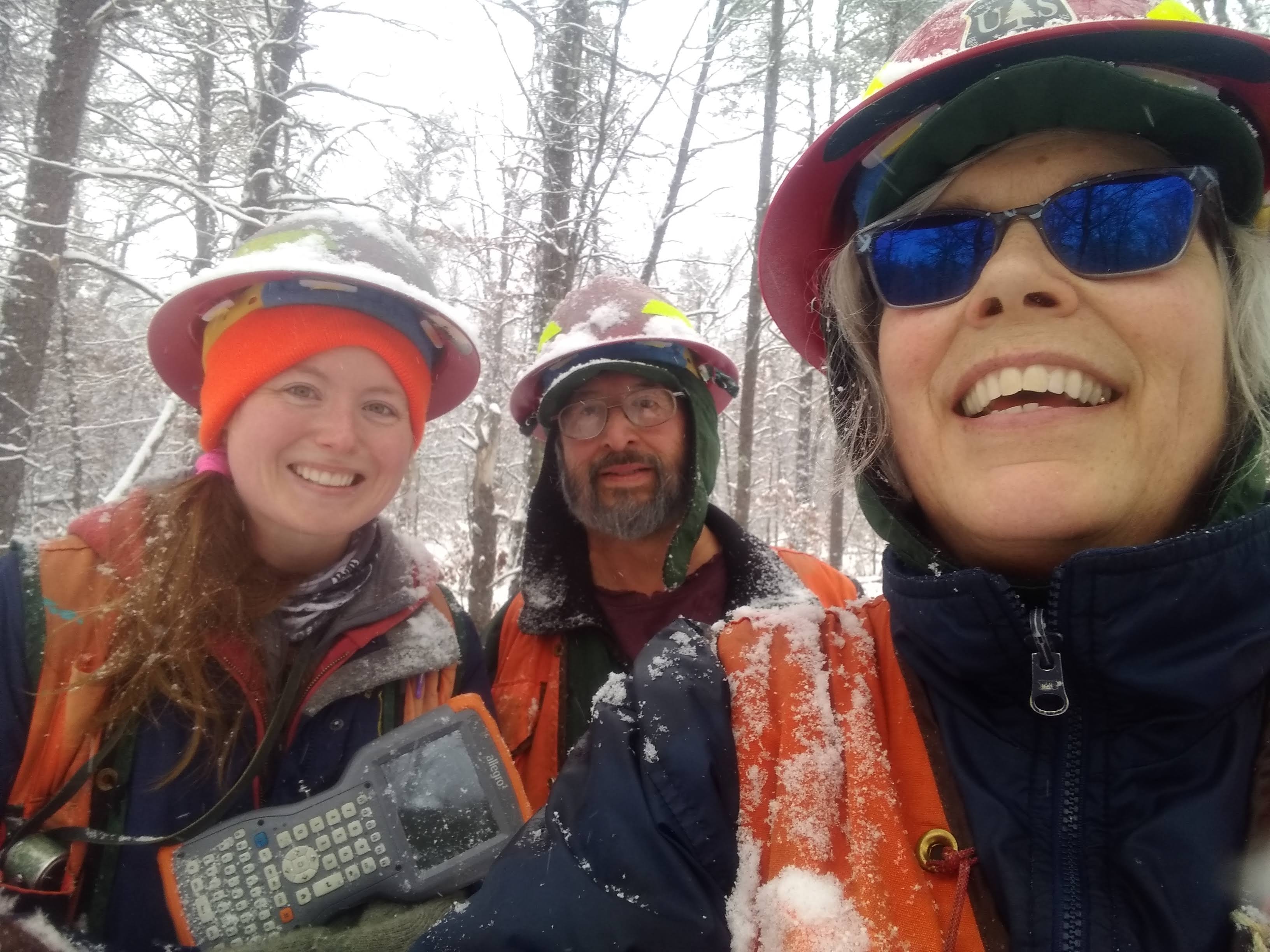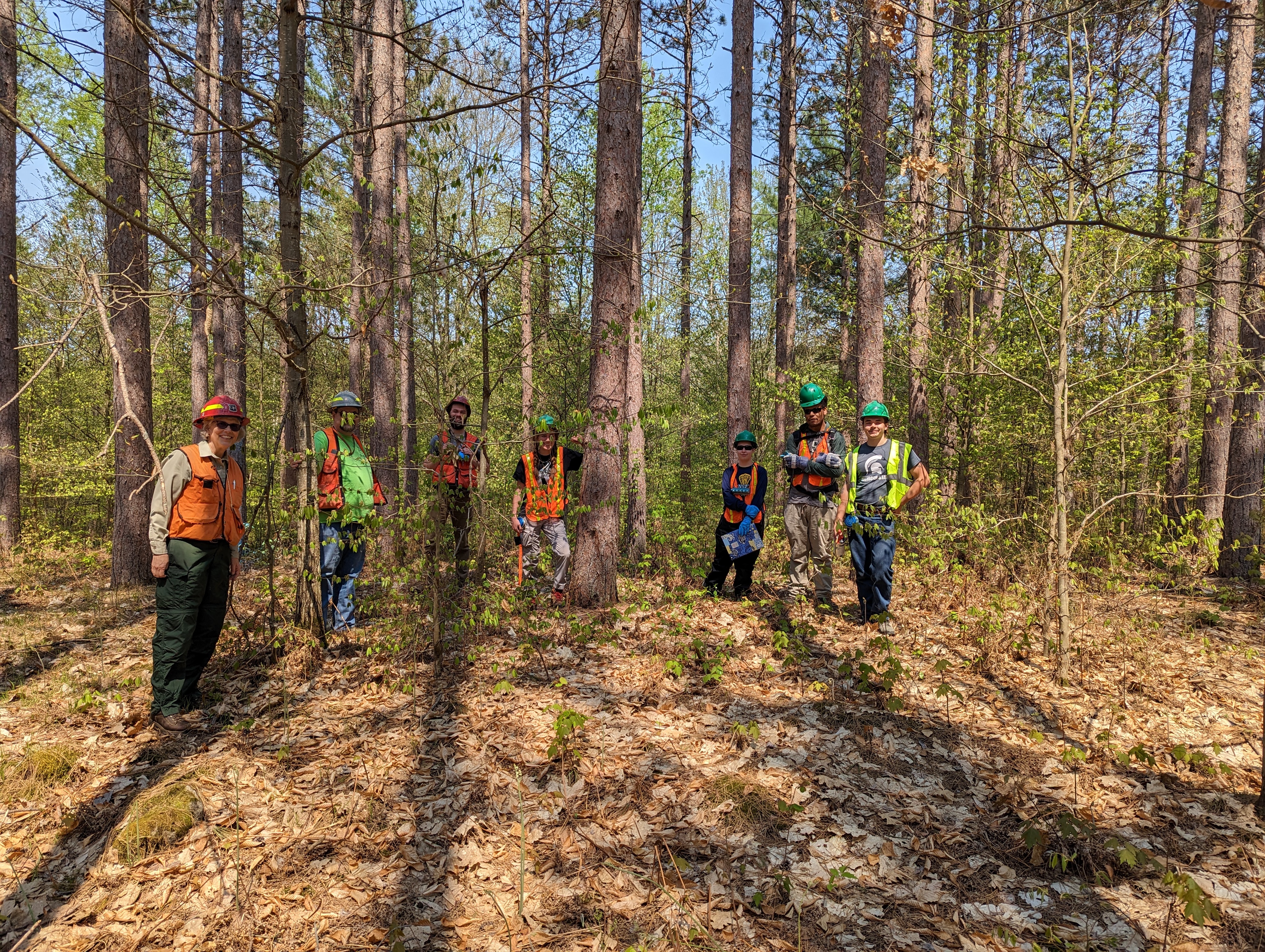The Tremendous Career of a Woman in Forestry
MSU Forestry alum, Barbara Heidel BS ’86, is retiring after 36 remarkable years with the U.S. Forest Service.

MSU Forestry alum, Barbara Heidel BS ’86, is retiring after 36 remarkable years with the U.S. Forest Service.
Barb’s first forestry work experience was a seasonal opportunity in Fairplay, Colorado, a district which ranges in elevation from 8,000 feet to 14,000 feet. After doing forest inventory and marking timber, she immediately knew the Forest Service mission was in line with her value system and was the place for her.
Barb knew since early in life, her interests would lead her to the forest. After a junior high school aptitude test included Forester in a list of well-suited professions, Barb’s mother provided her with the book Making a Living in Conservation, and her father gifted her a Woodsey Owl Poster.
“Michigan State University Forestry was always the only option!” Barb said.
Barb recalls entering MSU in 1980, the possibilities seemed endless. One of her favorite memories came from her first week on campus, walking through the Natural Resources Building mentally preparing for Forestry 101, when another forestry student, Tracy Knoop, recognized and approached her.
They had both spent summers at Sunrise Lake in Osceola County, Michigan at their family cabins and enrolling as students in the MSU Forestry program provided the spark to rekindle their friendship. When Barb went to work for the U.S. Forest Service, Tracy went to the Bureau of Land Management, where they still collaborated while on fire crews and have remained lifelong friends.

“Although the campus is big, it is the best. Supportive professors and the other forestry students made it feel like family,” Barb said.
Although coursework has changed somewhat since the 1980s, the values and connections the students form and develop remain the same. The MSU Forestry Department provides a diverse range of study and applications, including urban, utility, public, and industry timber positions.
“Regardless of which direction we were going, we stuck together, helped each other with assignments, and helped each other with job searches,” Barb said.
After graduation, Barb planned to work as an Urban Forester (ideally for the Detroit Zoo or a local municipality), having previous experience working for a utility company. The spring before graduation, now emerita Professor Donald Dickmann approached Barb and offered, “before you go back to Detroit Edison, you should check out the Forest Service.” This led Barb to a student requisition from the Pike San Isabel National Forest, South Park Ranger District. Carpooling with a few other forestry students, Barb embarked on her first seasonal position with the USFS in Colorado.
Barb worked on the South Park Ranger District in Colorado for five seasons, then moved into a permanent forester position in the district, where she remained the timber forester until 1999, preparing timber sale contracts, easements and use permits, fighting fire, and working on prescribed burns.
Needing to move back closer to family, Barb took a recreation management position in the Cadillac Manistee Ranger District. She always knew she would end up back in timber, but really loved the couple years spent doing recreation work.
“I learned so much and gained an appreciation for what our co-workers in recreation contend with, but, when a timber management assistant ranger position opened up, I moved back to timber,” she said.
Forestry professor David Rothstein recalls meeting Barb in the Spring of 2017 when he took his Forestry Field Studies class to the Manistee District for a silvicultural field tour. “Barb and her team were incredibly enthusiastic about engaging with my students and providing a rich experience in both technical aspects of forestry as well as professional and career advice. It was clear to me in that first meeting that Barb was an outstanding role model for my students, and she exemplifies all of the best values of our profession.”

“From that point forward, I made it a point to get Barb in front of my students any chance I could – no matter how far we had to drive. I am happy for Barb as she retires, but I am really going to miss her,” Rothstein said.
“Having worked with Barb for the past 20+ years, one of things that I admire about her most is her enthusiasm and willingness to serve as a mentor for others that are interested in forestry and natural resource management. Whether it be other employees, college students, international partners, or the local community, Barb serves as a leader in sharing her knowledge and providing opportunities for others to become engaged in all that we do,” said long-time colleague and friend, Chris Frederick, District Ranger with the U.S. Forest Service, Huron-Manistee National Forests.
Forestry is a male-dominated industry, and even today, fewer than 20 percent of foresters in the United States are female. Barb never let the statistics deter her, and credits female foresters a few years older than her, for really busting down barriers.
“I was lucky to work with and be supervised early on by men who were not generationally closed minded about diversity in the work force,” said Bard, who added that expectations were just as high physically and mentally for everyone.
“I approach every person with this in mind: What skill or talent do they bring to the team? What do they like to do that we can build on. If someone comes to you with preconceived ideas, use it as an opportunity to have a conversation.”
Barb is optimistic about the future opportunities the forestry industry has for women interested in the field.
“I know several women who operate logging equipment and are company owners. That is new in our business and a sign that things are going in the right direction. We must recognize each other’s character and integrity, and in doing so we set an example,” she said.
“Don’t let anyone convince you that there will not be a job for you. Good and tough times come and go. If this is what you love, stick it out. Work hard, don’t turn down opportunities even if you don’t see the value in them. It is always valuable to see from the other person’s point of view. If you love what you do, you will be good at it.”



 Print
Print Email
Email





